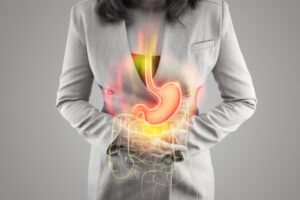
Why Colon Cancer Screening is Essential for Your Health
Early detection can identify precancerous polyps or cancer in its initial stages, significantly improving treatment outcomes.

Crohn’s disease is a chronic inflammatory condition that affects the gastrointestinal (GI) tract. It is a type of inflammatory bowel disease (IBD) that can cause symptoms such as abdominal pain, diarrhea, fatigue, weight loss, and malnutrition. The exact cause of Crohn’s disease remains unknown, but it is believed to result from a combination of genetic, environmental, and immune system factors. While there is currently no cure for Crohn’s disease, various treatments and lifestyle adjustments can help manage symptoms and improve quality of life.
Diet plays a pivotal role in managing Crohn’s disease symptoms, as certain foods can exacerbate inflammation or trigger flare-ups. While there is no one-size-fits-all diet for individuals with Crohn’s, identifying specific food triggers can help reduce discomfort. High-fiber foods like raw vegetables and whole grains may be difficult to digest during flare-ups, while dairy products can cause issues for those who are lactose intolerant.
Conversely, softer, low-fiber foods or those rich in omega-3 fatty acids, such as salmon, may help alleviate symptoms. Collaborating with a dietitian can help develop a personalized nutrition plan to support overall gut health and minimize adverse effects.
Certain foods may help manage Crohn’s disease by reducing inflammation and providing essential nutrients during flare-ups. Well-cooked vegetables, such as carrots, zucchini, and squash, are gentle on the digestive system and easy to tolerate. Lean proteins, including chicken, turkey, and fish, are excellent sources of nutrition without exacerbating symptoms.
Low-fiber fruits, such as bananas and melons, and refined grains, like white rice and oatmeal, can provide energy while minimizing digestive strain. Additionally, probiotic-rich foods, such as yogurt or kefir, can promote a healthy gut microbiome. It’s essential to tailor your diet to your specific needs and consult a healthcare professional for guidance.
Certain foods can exacerbate symptoms and should be approached with caution for those prone to flare-ups. High-fiber foods, such as raw vegetables, seeds, and legumes, can be challenging to digest and may irritate the digestive tract.
Spicy foods and strong seasonings are common culprits for triggering discomfort or inflammation. Fried or greasy foods, along with highly processed snacks, can strain the digestive system and lead to flare-ups.
Beverages like caffeinated drinks, alcohol, and carbonated sodas might also contribute to symptoms. Identifying and avoiding these triggers, whenever possible, is a crucial step in managing your condition effectively.
Building a diet tailored to managing Crohn’s disease starts with focusing on foods that support digestion and reduce inflammation. Incorporate low-fiber fruits like bananas and melons, along with well-cooked vegetables, as these are easier to digest.
Lean proteins such as chicken, fish, and eggs provide essential nutrients without overwhelming the digestive system. Opt for refined grains like white rice and pasta, which are gentler on the gut compared to whole grains.
Stay hydrated by drinking plenty of water and avoiding sugary or carbonated beverages. Keeping a food diary can also help identify personal triggers, making it easier to adjust your diet over time for optimal comfort and health.
Personalized nutrition acknowledges that each individual has unique dietary needs, influenced by factors such as age, genetics, lifestyle, and health conditions. By tailoring dietary choices to suit these specific needs, one can achieve better health outcomes, improved energy levels, and enhanced digestion.
This enables the identification of potential food sensitivities or allergies, providing a more targeted approach to prevent adverse reactions. Working with a nutritionist or using tools like food tracking apps can help you design a plan that aligns with your body’s specific needs, ensuring both sustained health and long-term well-being.
It’s important to consult your doctor if you’re experiencing persistent digestive issues, unexplained fatigue, or significant changes in your weight. These could be signs of underlying health conditions that require a professional evaluation. Additionally, if you’re considering drastic changes to your diet or suspect food allergies, your doctor can provide guidance or recommend appropriate testing. Regular check-ins with the professionals at Allied Digestive Health ensure that your nutritional choices align with your overall health goals and medical needs.

Early detection can identify precancerous polyps or cancer in its initial stages, significantly improving treatment outcomes.

When you’re under stress—whether from a demanding job, personal challenges, or even anxiety caused by IBS itself—it can trigger physical reactions in your body.

Maintaining awareness of hemorrhoid symptoms and consistent use of effective treatments can help prevent these long-term issues.

The connection between female sex hormones and IBS is complex but crucial to understanding why your symptoms fluctuate.

Colitis and flare-ups can vary in intensity and frequency, influenced by factors such as diet, stress, and individual health conditions.

Some may tolerate caffeine well, while others with IBS or acid reflux need to monitor their intake to prevent aggravating their symptoms.

While there is currently no cure for Crohn’s disease, various treatments and lifestyle adjustments can help manage symptoms and improve quality of life.

Irritable Bowel Syndrome (IBS) tends to affect women more frequently than men, and hormones may play a significant role in this disparity.

After a colonoscopy, patients are typically monitored in a recovery area until the effects of the sedative or anesthesia begin to wear off.

Both conditions appear to be influenced by heightened immune responses and the release of pro-inflammatory substances, further connecting their underlying mechanisms.

A gut cleanse is a practice designed to enhance digestive health by removing toxins, waste, and harmful bacteria from the gastrointestinal tract.

The length of a flare-up often depends on multiple factors, including stress levels, dietary triggers, and the effectiveness of current management strategies.
For Your Visit
Brick Office
P: 732-458-8300
Brick Medical Arts Building
1640 Route 88, Suite 202
Brick, New Jersey 08724
Mon – Fri: 8:30AM – 5:00PM
Sat & Sun: Closed
Neptune Office
P: 732-776-9300
Jersey Shore Medical Arts Building
1944 Corlies Ave. Suite 205
Neptune, New Jersey 07753
Mon – Fri: 8:30AM – 5:00PM
Sat & Sun: Closed
Jackson Office
P: 732-928-2300
706 Bennetts Mills Road
Jackson, New Jersey 08527
Mon – Fri: 8:30AM – 5:00PM
Sat & Sun: Closed
© All Rights Reserved